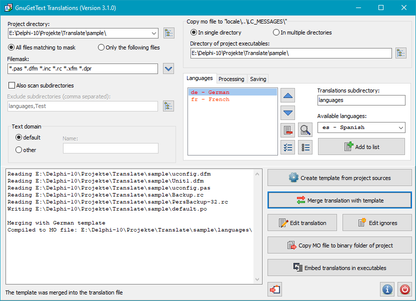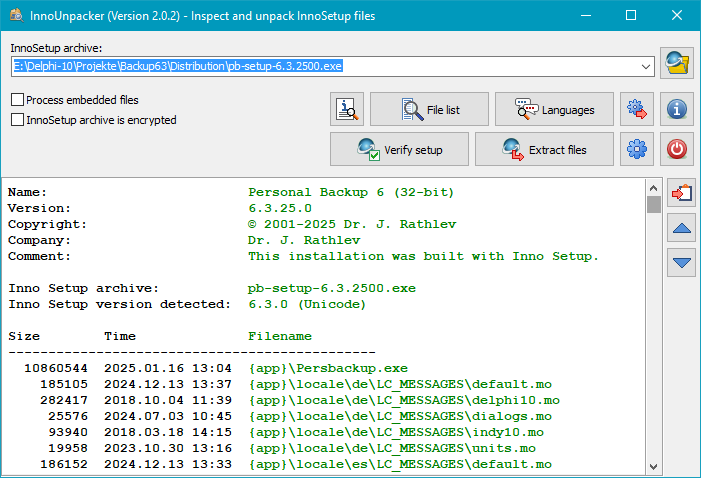



|
|
|
|
|
|
Since Windows Vista a new version of the Task Scheduler is implemented. In addition to
the features of the former version some new options are available, like running a
task after a scheduled start was missed or the use of user accounts without passwords.
The Windows API provides several new functions to integrate the Task Scheduler with
user programs.
To make this easier to the Delphi programmer, I developed several units which encapsulate the
functions of the Windows Task Scheduler 2.0 into Delphi objects. To demonstrate
the integration of these objects into own code, a sample program (new in August 2020) is included
to the package.
Note: The implementation is not complete. But all functions to create and edit time schedules for user applications are available.
Version 2.3 (January 2023)
This service was first introduced in the Microsoft operating system Windows XP and extended by several additional features in Windows 7,8 & 10 and Windows Server 2008/2012. It exploits the possibility of making snapshots using the NTSF file system, enabling even files that are blocked by running processes to be copied. The snapshot copies are stored at elsewhere in the file system and retained for as long as the snapshot lives, during which time they can easily be backed up.
The use of Volume Shadow Copies is described in detail in the Microsoft Software
Development Kit for Windows 7. As an example, you can find there a program (VSHADOW.EXE)
and the appropriate source code. This, as well as the required interfaces (header files)
to the system libraries, is however written in C++. To use VSS under Delphi,
it is first necessary to convert the header files into a Delphi unit (VssApi.pas
in the provided source package).
A second unit (VssUtils.pas) contains all routines from the Microsoft
sample program converted to Delphi. To facilitate the integration into user
written programs, all functions are bundled to a class (TVolumeShadowCopy).
For execution in an own thread, another class (TVssThread) is provided.
A sample snippet how integrate this into a user program can be found in the
readme.txt file which is part of the source package.
Finally, the package provided contains
the converted main part of the application example as a console application (VsToolkit).
This application is not based on the original Microsoft sample, but on the
modified version
Volume Shadow Copy Simple Client (VSCSC).
All programs and routines can be compiled for 32- and 64-bit systems (the latter
requiring at least Delphi XE2).
Notes: The routines provided will perform most of the functions needed
for backups, but a restore is not to date supported.
Running the program requires administrator rights.
Version 2.3.3 (March 2022)
If you connect a smartphone to a Windows computer, the content is not integrated into its file system, as is the case with USB storage devices, for example. The reason for this is that such devices are connected via the Media Transport Protocol (MTP) To access the content, you need the functions of the Windows-Portable-Devices-Interfaces (WPD).
The units required to integrate the WPD functions into your own Delphi programs are not yet part of the system libraries. I have therefore created the following units to enable access to the files of a device connected via MTP in my own Delphi programs:
Version 1.1 (November 2023)
GNU Gettext for Delphi founded by Lars B. Dybdahl is a system for providing a Delphi application with a multilingual user interface. After a short period of familiarization, you can work very efficiently with it. It also offers the great advantage that no Delphi development environment needs to be available to create a translation, so that every user has the option of translating into their own language. All you need is a simple text editor or, better still, the following specially developed editor programs:
The basis for all translations is always a Delphi application, preferably written in English.
Note: The programs described below can also be used for Embarcadero C++ Builder.
The translations are created in two steps:
Parts that have already been translated are automatically adopted when the program is updated, so that the effort required to update the translation is kept to a minimum. The two required programs are called up in Windows Explorer via the context menu:
1. Right-click on a directory

|
2. Right-click on a po file

|
|
| will create the template (po file). | will merge template and translation and start PoEdit for post-processing. |
The program for creating templates (ggdxgettext.exe) has been slightly extended:
Also the other programs from the original package were revised:
Important note: If a translation with ggassemble.exe is to be embedded in an exe file created with Delphi, it is important that the appropriate GnuGetText.pas unit from the download offered here is used in the Delphi source texts of the project.

The integration in the form of context menus is certainly very practical for sporadic
editing of individual translations. However, when creating a multilingual program
(e.g. in English, German and other languages), using it in this way can be a bit tedious,
especially if the texts still need to be continuously adapted. You have to constantly
change directories and only reach your destination after several mouse clicks.
The program GgtTranslate, which combines all the steps for each project,
even for several languages, under one user interface, provides a remedy here.
It uses the same settings (dxgettext.ini) as the original programs, but
allows all steps to be carried out immediately one after the other:
In addition the current version 3.1 also offers the following additional options:
In addition, some auxiliary programs for editing po files are provided:

If you want to inspect an install package created with Inno Setup or extract its files, you can use the console application Inno Setup Unpacker. For easier handling you can download a Windows-GUI for this below.
The executable setup to be processed can be loaded via a file selection dialog,
just by drag & drop, using the command line or by an entry in the Windows context menu
for exe files. Immediately after opening, the basic file info and the list
of included files are displayed. To extract files, just click the appropriate
button and select the destination directory.Optionally, you can specify whether
only the installation script, the files matching a filter, or the files selected
by the user should to be extracted.
Inno Setup files up to version 6.7.0 are supported.
New in version 2.2.1: Support dark display mode
| Command line (optional): InnoUnpack setupname [Options] |
||
| setupname | Name of InnoSetup archive | |
| /d:destdir | Directory for unpacked files | |
| /f:filter | File filter | |
| /w:password | Encryption password | |
| /l:xx | Language selection (xx = en, de, fr, it or hu) | |
| /m | Process internal embedded files | |
| /s | Extract files without paths | |
| /a | Process all copies of duplicate files | |
| /o | Overwrite files | |
| /p | Run as portable program | |
| /k | Run in Dark Mode | |
Windows InnoUnpacker 2.2.3 (February 2026) (Languages: English, German, French, Italian, Spanish, Hungarian and Chinese) - suitable for install packages created with InnoSetup 2.0 and 6.7.0
Unicode version of the console application Inno Setup Unpacker - for Inno Setup 2.0.7 to 6.7.0 (January 2026)
This version can be used as replacement for
innounp 0.50 to fix Unicode issues
and for support of Inno Setup since version 6.2.